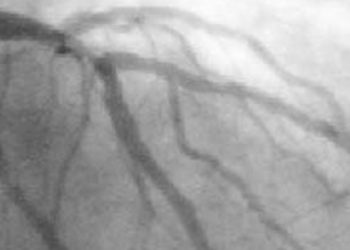Beta-blocker interruption not noninferior to continuation following myocardial infarction
1. In this randomized controlled trial, among patients with a history of myocardial infarction (MI), interruption of long-term beta-blocker therapy was not found to be noninferior to beta-blocker continuation in preventing death, MI, stroke, and hospitalization for cardiovascular reasons.
2. Interruption of long-term beta-blocker therapy did not improve patient-reported quality of life compared with beta-blocker continuation.
Evidence Rating Level: 1 (Excellent)
Study Rundown: Beta-blocker therapy is a standard of care for patients following MI, with a prescription rate of over 90% in most Western registries. The current lack of consensus regarding the optimal duration of beta-blocker therapy following MI has resulted in lifelong therapy in many patients. However, evidence for the benefit of beta-blocker therapy in patients with MI is largely derived from trials conducted before the modern era of myocardial reperfusion. Early coronary reperfusion therapy has led to a significant decrease in the risks of heart failure and death after MI, raising questions about the additional benefits provided by lifelong beta-blocker therapy. The present trial compared the effects of beta-blocker interruption with those of beta-blocker continuation on the risk of death, MI, stroke, and hospitalization for cardiovascular reasons and patient-reported quality of life among patients with a history of MI. Interruption of beta-blocker therapy was not shown to be noninferior to beta-blocker continuation concerning the risk of death, MI, stroke, or hospitalization for cardiovascular reasons. Additionally, beta-blocker interruption did not improve patient-reported quality of life. The study was limited by the fact that it was not blinded, which could have influenced several outcomes, such as patient-reported quality of life. Additionally, the trial was conducted within a single country, France, and the results may not be generalizable to other countries with different healthcare systems and practices. Nevertheless, these findings provide novel insights regarding beta-blocker interruption following MI, challenging the validity of current recommendations for the discontinuation of long-term beta-blocker therapy.
Click to read the study in NEJM
In-Depth [randomized controlled trial]: This multicenter noninferiority trial compared the effects of beta-blocker interruption with those of beta-blocker continuation on the risk of death, MI, stroke, and hospitalization for cardiovascular reasons and patient-reported quality of life among patients with a history of MI. Patients with a history of MI at least six months before enrollment who were being treated with a beta-blocker and who did not have chronic heart failure, a left ventricular ejection fraction of less than 40%, any cardiac event in the six months before enrollment, or any other primary indication for beta-blocker therapy were included. The primary outcome was a composite of death, nonfatal MI, nonfatal stroke, or hospitalization for other cardiovascular reasons. The main secondary outcome was the change in score on the European Quality of Life-5 Dimensions (EQ-5D) questionnaire from baseline to six months and 12 months. A total of 3698 patients underwent randomization, with 1846 assigned to the beta-blocker interruption group and 1852 to the beta-blocker continuation group. A primary-outcome event occurred in 23.8% of patients in the beta-blocker interruption group, compared with 21.1% of patients in the beta-blocker continuation group (Risk Difference [RD], 2.8 percentage points; 95% Confidence Interval [CI], <0.1 to 5.5). As such, beta-blocker interruption was not non-inferior to beta-blocker continuation, with a hazard ratio of 1.16 (95% CI, 1.01 to 1.33; p=0.44 for noninferiority). Additionally, interruption of beta-blocker therapy did not improve patient-reported quality of life compared with beta-blocker continuation, with the mean absolute change in EQ-5D score between baseline and the last follow-up being 0.033 in the interruption group and 0.032 in the continuation group (mean difference, 0.002; 95% CI, -0.008 to 0.012). In summary, interruption of long-term beta-blocker therapy following MI was not shown to be noninferior to beta-blocker continuation concerning the risk of death, MI, stroke, or hospitalization for cardiovascular reasons. Beta-blocker interruption was also not associated with improved patient-reported quality of life.
Image: PD
©2024 2 Minute Medicine, Inc. All rights reserved. No works may be reproduced without expressed written consent from 2 Minute Medicine, Inc. Inquire about licensing here. No article should be construed as medical advice and is not intended as such by the authors or by 2 Minute Medicine, Inc.







